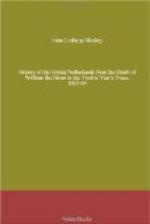When the ambassador arrived in London he was lodged at Arundel palace. He at once became the cynosure of all indigenous parties and of adventurous politicians from every part of Europe; few knowing how to shape their course since the great familiar lustre had disappeared from the English sky.
Rosny found the Scotch lords sufficiently favourable to France; the English Catholic grandees, with all the Howards and the lord high admiral at their head, excessively inclined to Spain, and a great English party detesting both Spain and France with equal fervour and well enough disposed to the United Provinces, not as hating that commonwealth less but the two great powers more.
The ambassador had arrived with the five points, not in his portfolio but in his heart, and they might after all be concentrated in one phrase— Down with Austria, up with the Dutch republic. On his first interview with Cecil, who came to arrange for his audience with the king, he found the secretary much disposed to conciliate both Spain and the empire, and to leave the provinces to shift for themselves.
He spoke of Ostend as of a town not worth the pains taken to preserve it, and of the India trade as an advantage of which a true policy required that the United Provinces should be deprived. Already the fine commercial instinct of England had scented a most formidable rival on the ocean.
As for the king, he had as yet declared himself for no party, while all parties were disputing among each other for mastery over him. James found himself, in truth, as much, astray in English politics as he was a foreigner upon English earth. Suspecting every one, afraid of every one, he was in mortal awe, most of all, of his wife, who being the daughter of one Protestant sovereign and wife of another, and queen of a united realm dependent for its very existence on antagonism to Spain and Rome, was naturally inclined to Spanish politics and the Catholic faith.
The turbulent and intriguing Anne of Denmark was not at the moment in London, but James was daily expecting and De Bethune dreading her arrival.
The ambassador knew very well that, although the king talked big in her absence about the forms which he intended to prescribe for her conduct, he would take orders from her as soon as she arrived, refuse her nothing, conceal nothing from her, and tremble before her as usual.
The king was not specially prejudiced in favour of the French monarch or his ambassador, for he had been told that Henry had occasionally spoken of him as captain of arts and doctor of arms, and that both the Marquis de Rosny and his brother were known to have used highly disrespectful language concerning him.
Before his audience, De Rosny received a private visit from Barneveld and the deputies of the States-General, and was informed that since his arrival they had been treated with more civility by the king. Previously he had refused to see them after the first official reception, had not been willing to grant Count Henry of Nassau a private audience, and had spoken publicly of the States as seditious rebels.




